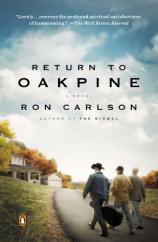Return to Oakpine
Review
Return to Oakpine
In RETURN TO OAKPINE, his fifth adult novel, Ron Carlson has taken what could have been a mawkish story about four high school classmates who reunite in a small Wyoming town as one of them lies dying and instead has created an engaging miniature that reveals the strength and persistence of long-ago forged bonds of friendship.
In 1969, Craig Ralston, Frank Gunderson, Mason Kirby and Jimmy Brand formed a cover band they name Life on Earth. Thirty years later, Craig now runs Oakpine’s hardware store and Frank owns a popular local bar. When Mason, a successful Denver attorney, returns to repair and sell his parents’ house, and Jimmy, a novelist and critic, comes home from New York City, broke and dying of AIDS, the bandmates achieve an unplanned, improbable reunion. In a recent interview, Carlson described this novel as an “ensemble book,” and that’s an apt description of the carefully balanced role each of these characters plays in the story.
"Ron Carlson has taken what could have been a mawkish story about four high school classmates who reunite in a small Wyoming town as one of them lies dying and instead has created an engaging miniature that reveals the strength and persistence of long-ago forged bonds of friendship."
As he and Craig find themselves deep in a renovation project that’s more satisfying to Mason than the lucrative legal career he seems ready to abandon, he quotes his father’s observation that “part of us is always seventeen.” While there’s enough evidence in the relationships of these characters to validate that statement, Carlson roots the novel in the realities of their lives in the present, not in some nostalgic longing for the past. Craig’s wife, Marci, teeters on the knife’s edge of an affair with her boss at the local art museum, while Frank’s ex-wife, Kathleen, still bitter about their divorce, has yet to come to terms with the fact of his marriage to a much younger woman.
But the most wrenching scenes revolve around Jimmy Brand, who spends his last days in a small garage adjacent to his parents’ house, rather than inside it. He’s consigned to that semi-exile because of his father’s unwillingness to accept his dying son’s homosexuality. There are some beautiful moments in which Jimmy, who has drawn heavily on his early life in Oakpine for his novels, teaches the craft of writing to a local girl, a friend of Craig’s high school-age son, who visits his bedside to share her work.
Hovering over the story of the four bandmates is the long-ago death of Jimmy’s brother Matt, a high school football star who’s killed in a drunken boating accident a couple of months before he’s scheduled to head off to college. The incident caused Jimmy to flee Oakpine for New York City, and all these years later, against the facts, he holds himself responsible for Matt’s death.
Whether it’s a celebratory bonfire, the homecoming dance or the passion for high school football that delivers a good portion of Oakpine’s population to the bleachers on a Saturday afternoon, Carlson gives this fictional town a palpable reality. “If a person was raised here, he knows the way the light falls in this town on any given week, even you who have been absent for years. That isn’t true for any other place for you.” By the time we are finished with this brief novel, we have something of that sense ourselves.
Carlson, a native of Utah who said in the earlier-mentioned interview that his “head is full of mountains and the wind that approaches them,” also has an instinctive feel for the Western landscape. In passages like this one, he demonstrates that depth of understanding and his talent for conveying it: “The afternoon winter wind was slow and ponderous and unrelenting and ultimately called fierce, though it was nothing except the icy air moving along the frozen plates of the world, and the snow had crusted and blown into waves against the fences along Berry Street in Oakpine, Wyoming. The day was closed.”
Carlson isn’t reaching for any big statements here, and in that sense, the modesty of his ambitions is well-matched to the unremarkable lives of his four main characters. Instead, he’s content to focus on the moments that usually pass unregarded through our lives, while exploring some of the ways time sands away the rough edges of the past. Out of all this, he succeeds in offering a moving depiction of friendship, love and loss.
Reviewed by Harvey Freedenberg on July 19, 2013
Return to Oakpine
- Publication Date: October 28, 2014
- Genres: Fiction
- Paperback: 272 pages
- Publisher: Penguin Books
- ISBN-10: 0143125591
- ISBN-13: 9780143125594





